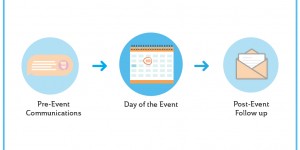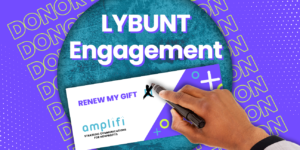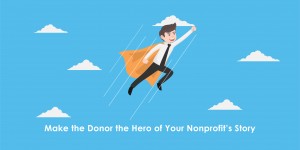Over the last several weeks we’ve discussed what fundraisers should prepare before they make their ask. It was after attending a recent panel discussion hosted by the New York City chapter of the AFP that the inspiration for this series came to fruition. From focusing on building relationships, practicing the art of active listening, knowing how to speak of their organization and apply useful data to appeals and conversations, development professionals reading this blog should now feel poised and ready to solicit donors effectively.
During that panel discussion, moderator and expert fundraiser Laura Fredricks made a valid point:
“Hearing “no” from a donor is just an opportunity to ask better. Our donors leave clues and we miss every one of them.”
Preparing to make the ask is a crucial step in the fundraising process, but how prepared are we as fundraisers for what happens after that moment occurs? When a donor chooses not to give, is it a door that’s closed or a window that’s opened? We sat down with Laura to get her thoughts on how fundraisers can spin a response that sounds like “no” into something way better.
AG: Laura, thank you so much for taking the time to talk with us today.
LF: You’re welcome! I’m looking forward to getting into the discussion.
AG: Alright, let’s get to it. During the panel you said, “Donors leave clues and we miss every one of them.” Could you elaborate a little more and maybe tell us what those clues really look like?
LF: The trick to these interactions, particularly if they’re in person, is to read between the lines. Often a response, or rather an action not taken by a donor, isn’t a firm ‘yes’ or ‘no’ but really an indicator of their willingness to support your organization.
Cultivation is key, so in instances where you’ve got that personal relationship built out it’s easier to be frank. But if this is a first time or recurring conversation that doesn’t seem to result in a donation, you’ll want to look for clues… especially if you know the person has the interest and capacity to give.
So when someone says something like, “I’m not sure I can do that right now” the clue and operative word is now. That’s when you know you have them. A response to something like this should be “Fantastic, this is good to know. Let’s work on this together. How can we make this happen so it works for you, and the people and cause you love most?”
Take a moment to further the conversation and ask questions that will help you glean more information from this individual.
AG: Great, that’s a really fresh perspective. Piggybacking off the previous question, do you find that fundraisers have to be in a specific state of mind in order to be receptive to what their donors are telling them? Or just to pick up on these kinds of clues?
LF: There are 3 rules that I tell everyone I work with that apply here. Rule #1: It’s about them, not you. Rule #2: Practice listening. Remember, you’re looking for key indicators of a willingness to give. And Rule #3: Repeat rules one and two! The ask breaks down because we over ask the ask. Your ask should be two sentences and a question. Keep it simple!
AG: Okay, so let’s talk a little bit about “no.” Fundraisers are going to get a “no” more often than they’d like, but I’ve heard you say that “no” is an opportunity to do something different. How do you recommend fundraisers use this chance to re-frame the conversation to spin that into a “yes”?
LF: First off, remember that you won’t often hear a straight out no. You’ll hear many things that sound like it, so be sure it is. Secondly, if it is a firm “no,” remember this: NO now doesn’t mean NO later. Your job now becomes about keeping the conversation alive. Business dynasties were built upon the dedication of visionary leaders who expected and got told “no” hundreds of times. Persevere and stay focused.
AG: Do you have any examples of what could be misinterpreted as a “no”?
LF: Again, “right now” isn’t necessarily a decline, but really means “I may be able to do that later.” Someone might also say “I have to think about it.” The word “think” in this case is an issue of time. Don’t leave the person out there to figure out the time element on their own. Work with them to figure out a schedule that works for them. One of the biggies is “That’s a lot of money.” Your response to that statement should be something along the lines of, “Yes it is, and know that we don’t take this lightly. Let’s work through this together. What’s important is that you want to support us, so let’s see what we can do.”
AG: So sticking with the “no” element, how can fundraisers better engage with and grow the gifts of their long term and most consistent donors when they aren’t really moving forward in a way you’d like?
LF: Giving and living are organic. People have varying circumstances that ebb and flow in their lives. The best askers are the ones that hang in there and stay with their top people regardless of the answer. I’ve had people say they will never invest, give, support, and then turn around and give amazing amounts. If you are not “in it to win it” you will lose it and lament it.
AG: This has been really incredible. I think our readers will benefit greatly from your insights!
LF: Thanks for having me, it’s been wonderful talking through these ideas.
The Final Word
Never underestimate the importance of a well-developed relationship and the ability to truly hear what donors are telling you. Successful fundraising is about purposeful persistence and finding the right opportunities. This advice is applicable when it comes to in-person conversations and throughout all stages of appeal campaigns. Look for ways to gain valuable information about your donors, and use what they’re telling you to forge a deeper connection with them as your partner.
You Might Also Enjoy:
+ Before You Make the Ask: Listen Actively
+ Before You Make the Ask: Build Relationships By Being Personal
+ Keep Communications Afloat: The Battle Against Donor Attrition
Like what you see? Stay in touch!
About Laura
About Laura Fredricks:
LAURA FREDRICKS is a multi-million dollar ASK-maker who, as Founder & CEO of THE ASK©, teaches nonprofits and businesses how to confidently, willingly and successfully ask for money. Fredricks is today’s leading authority on “How to A$K© for Money – and More of It!” She has helped hundreds of organizations worldwide raise multi-millions through her unique approach to fundraising. She is author of “THE A$K: How to ASK for your Nonprofit Cause, Creative Project and Business Venture.” Most recently Laura joined a star-studded list of Wellness Experts and is the “Money Wellness Expert” with an all new 30-day on-line money wellness program. Her recent book: “Money Wellness: Is Money Making you $ick” will show you how money affects every decision you make which affects your health, and gives you the steps you can take today to work out and through your Money Blockers.
Find her online at EXPERT on the ASK and on Twitter @expertontheask.












